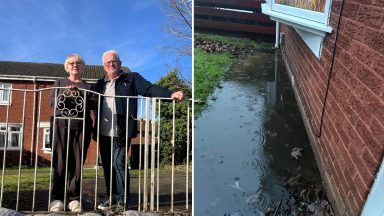Fluoride could be added to the tap water of more than a million households in the west of Scotland under plans being actively considered by the country’s largest health board.
NHS Greater Glasgow and Clyde (NHSGGC), which covers some 1.2 million people in Glasgow and five other council areas surrounding the city, says it is actively considering ways to introduce the mineral into the region’s water supply.
It comes after the British Dental Association (BDA) warned that oral health inequality is set to widen as a result of the coronavirus pandemic.
The association also said adding fluoride to drinking water would save the NHS “a fortune”.
Fluoride is a naturally occurring mineral found in water in varying amounts, depending on where people live.
It can help to prevent tooth decay, which is why it is added to many toothpastes, while in some parts of the country it is added to the water supply through a process called fluoridation.
A statement from NHS Greater Glasgow and Clyde said: “Evidence had shown water fluoridation is a safe and effective public health intervention and can narrow the inequalities in dental disease among children living in more and less deprived communities.
“The implementation would need to be considered on a Scotland-wide or regional basis, using the example of successful implementation in the north of England.
“At the committee it was agreed we would engage with the Chief Medical and Dental Officers, Public Health Scotland, Scottish Government and the other 13 health boards in Scotland to establish the way to proceed.”
The Drinking Water Quality Regulator for Scotland says fluoride is currently not added to any drinking water supply in the country.
NHS Grampian said it currently has no plans to follow NHSGGC in considering whether to add fluoride to tap water in the north-east of Scotland.
STV News has contacted several other health boards – including NHS Lothian and NHS Tayside – for their stance on the situation.
The BDA has long advocated water fluoridation in Scotland.
It says millions of dentist appointments have been lost since lockdown, adding that services remain significantly under capacity and existing public health programmes are facing ongoing disruption.
Robert Donald, chair of the British Dental Association’s Scottish Council said: “NHS Greater Glasgow and Clyde are to be commended for showing leadership on a policy that’s safe, effective and would save our health service a fortune.
“Covid means Scotland’s shameful oral health inequalities are set to widen, so it makes perfect sense to consider one of the most effective tools we have.
“Westminster has woken up to water fluoridation, and Holyrood needs to do the same.
“Ministers can either sit back and leave it to the odd enlightened health board to press ahead, or take charge, and help unlock lasting health benefits for millions.”
Around one in 10 people in England have fluoride added to their drinking water. These schemes cover much of the North East, Midlands, North West, East and Yorkshire and the Humber.
Across the UK water fluoridation has seen no expansion in a generation, as a result of decision making being delegated to local level.
But the Health and Care Bill before the UK Parliament will shift responsibility to Sajid Javid, the secretary of state for health, and could lead to significant expansion of coverage south of the border.
When pressed by the BDA to adopt a similar position in the run up the last Holyrood elections, the SNP said they have “no plans” to support the policy if re-elected.
Javid said last month: “The evidence is clear: water fluoridation is a safe and effective measure to help improve our nation’s oral health.
“This report continues to highlight how fluoridation can help reduce cavities and tooth extractions among children, especially those in more deprived communities, helping us level up health across the country.
“Through our Health and Care Bill, we will aim to make it simpler to roll out water fluoridation in more areas.”
The NHS says it’s uncommon in the UK for fluorosis to be severe enough to seriously affect the appearance of teeth because fluoride levels in water are carefully monitored by the Drinking Water Inspectorate and adjusted if necessary.
There have been some concerns that fluoride may be linked to a variety of health conditions. But reviews of the risks have so far found no convincing evidence to support those fears.
A Scottish Government spokesperson said: “Legislation relating to water fluoridation has been in place since 1985.
“This gives health boards the option, where they can demonstrate the support of local communities for such a move, to ask Scottish Water to introduce water fluoridation in their area. No such proposals have been put to the Scottish Government.
“Our priorities for enhancing population oral health is through supporting dedicated programmes such as Childsmile that target good oral hygiene and building positive habits for the rest of children’s lives.”
Follow STV News on WhatsApp
Scan the QR code on your mobile device for all the latest news from around the country




























